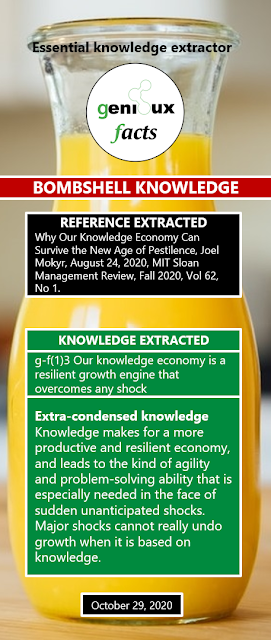Fuel your growth with essential knowledge
Extra-condensed knowledge
Knowledge makes for a more productive and resilient economy, and leads to the kind of agility and problem-solving ability that is especially needed in the face of sudden unanticipated shocks
Condensed knowledge
- The 20th century has shown a resilience that has no equal in history.
- Major shocks cannot really undo growth when it is based on knowledge.
- Knowledge, once acquired, cannot easily be reversed. In theory, of course, knowledge can be lost when everyone who possesses it dies and there are no stored-up copies in books or models. This can happen, and it has in fact occurred in history.
- In the past, shocks to the Smithian system that made markets work could lead to devastating and permanent damage to economic performance and living standards. The best-known case was the decline of the Roman Empire.
- What modern economic growth has achieved, based on more productive technology and the science that underlies it, is a level of prosperity that is much more resilient.
- Despite the best efforts of homicidal dictators and foolish generals, most human-made catastrophes have, on the whole, not materially slowed the rate of economic growth in the past century.
- The example that drives this home is the astonishing recovery of Germany after 1945.
- The Germans who managed the comeback called it the “economic miracle,” but in retrospect, it was not a miracle at all — just an affirmation that their prosperity rested on a solid base of knowledge.
- The pandemic is a classic unanticipated supply shock. But it will not be the next Black Death or Irish Potato Famine. In a modern economy, the advanced nations are much more resilient than ever before, even if the sharp temporary fall in output and employment seem frightening.
- Knowledge not only makes for a more productive and resilient economy but can also lead to the kind of agility and problem-solving ability that is especially needed in the face of sudden unanticipated shocks.
- Leaders of our business and technology community would be wise to keep sight of the flexibility and adaptability of our economy.
Category 1: A new, better world for everyone
[genioux fact extracted from MIT SMR]
Authors of the genioux fact
References
Why Our Knowledge Economy Can Survive the New Age of Pestilence, Joel Mokyr, August 24, 2020, MIT Sloan Management Review, Fall 2020, Vol 62, No 1.
ABOUT THE AUTHOR
Joel Mokyr is the Robert H. Strotz Professor of Arts and Sciences and professor of economics and history at Northwestern University, and the Sackler Professor (by special appointment) at the Eitan Berglas School of Economics at Tel Aviv University.
A Culture of Growth
Mokyr presents his explanations for the Industrial Revolution in the 2016 book A Culture of Growth: The Origins of the Modern Economy. The book has received positive reviews. Deirdre McCloskey described it as a "brilliant book... It’s long, but consistently interesting, even witty. It sustains interest right down to page 337... The book is not beach reading. But you will finish it impressively learned about how we got to where we are in the modern world." In her review, McCloskey furthermore lauded Mokyr as a "Nobel-worthy economic scientist".


3997%20The%20Prism%20of%20Transformation%20(The%20Cover%20Image).png)

3906%20Cover%20with%20Title,%20subtitle,%20OID%20and%20Abstract.png)


3819%20Cover%20with%20title%20and%20subtitle.png)
4026%20Cover,%20Gemini.png)
3660%20Cover%20Image.png)
4012%20THE%20THREE%20ENGINES%20OF%20DISCOVERY,%20Cover.png)
3932%20Cover%20with%20Title,%20and%20OID.png)
3949%20Cover%20with%20Title,%20Subtitle,%20and%20OID.png)